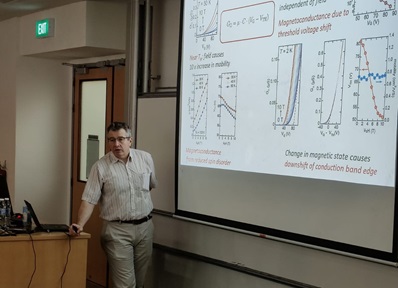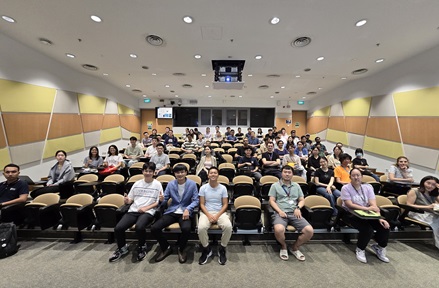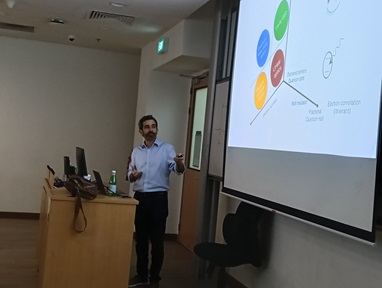IAS Frontiers Conference on Artificial Intelligence
Luqman Alka | NTU College of Computing and Data Science Graduate Students' Club
On 23 April 2025, the College of Computing and Data Science (CCDS) at NTU proudly hosted the IAS Frontiers Conference on Artificial Intelligence, a full-day event that brought together leading voices from Singapore and across the globe. Helmed by Prof Luke Ong, Vice President (AI and Digital Economy) and Founding Dean of CCDS, alongside Prof Bo An, Head of the Division of AI at CCDS and President’s Chair Professor in Computer Science and Engineering, the conference featured a vibrant lineup of cutting-edge research, bold ideas, and reflections on the future of artificial intelligence.
Kicking off the day, Prof Luke Ong emphasised the rapid advancements in machine learning and set the stage for the rich discussions ahead. His message framed the conference as a key milestone in NTU’s mission to shape global AI discourse from Asia.
-opens-the-frontiers-conference-on-ai.jpg?sfvrsn=f7e9e28e_1)
Prof Luke Ong (Vice President (AI & Digital Economy) and Dean, College of Computing & Data Science) opens the Frontiers Conference on AI, highlighting rapid advancements in machine learning and NTU’s role in shaping global AI discourse.
The conference opened with two thought-provoking sessions on the future of Human–AI interaction and AI sovereignty. Diyi Yang (Stanford University) traced the evolution from simple GUI commands to rich conversations, introducing her AI Partner-AI Mentor framework that enables LLMs to coach users in emotional and professional scenarios. She emphasised the shift from AI as a tool to AI as a collaborative teammate. Following this, Antoine Bosselut (EPFL) addressed the importance of Sovereign AI; which are democratised systems tailored to national contexts, thus highlighting how culturally relevant, legally compliant models can advance national interests without compromising performance.
After the morning break, the conference continued with two exciting sessions on AI alignment and scientific discovery. Stephen McAleer (OpenAI), joining virtually, highlighted the urgent need for high-compute alignment and control, presenting strategies like agent monitoring, robust reward models, and self-play to ensure safe and controllable AI agents. Following that, Mengdi Wang (Princeton University) showcased how AI is revolutionising scientific discovery from vaccine design to CRISPR guidance; and introduced hierarchical reinforcement learning as a powerful tool to help researchers tackle complex challenges more efficiently and independently.
-presents-on-sovereign-ai-during-ias-frontiers-conference-on-ai.jpeg?sfvrsn=d492db60_1)
Asst Prof Antoine Bosselut (EPFL) presents on Sovereign AI and highlights its foundations, showcasing the supporting infrastructure and research community driving these efforts.
After lunch, the conference shifted focus to strengthening the foundations of generative AI. Yarin Gal (University of Oxford) addressed the risk of AI model collapse caused by overreliance on synthetic training data, proposing solutions like semantic clustering and hallucination detection to enhance the trustworthiness of LLM outputs. He emphasised the urgent need for better attribution and uncertainty measures. Following that, Stefano Ermon (Stanford University) introduced Diffusion Language Models as a promising alternative to traditional LLMs, highlighting their potential for unified, multimodal generation and sharing real-world applications from his work at Inception Labs.
-asst-prof-diyi-yang-(stanford-university)-assoc-prof-mengdi-wang-(princeton-university)-and-stephen-mcaleer-(openai)-during-ias-frontier-conference-on-ai.jpg?sfvrsn=8d795516_1)
Insightful presentations by some of the conference’s esteemed speakers (from top left clockwise): Assoc Prof Yarin Gal (University of Oxford); Asst Prof Diyi Yang (Stanford University); Assoc Prof Mengdi Wang (Princeton University); and Stephen McAleer (OpenAI).
The afternoon sessions continued with insights into improving the speed, safety, and security of generative AI. Arnaud Doucet (University of Oxford and Google DeepMind) introduced advancements in speculative sampling, a promising method to accelerate diffusion models without sacrificing output quality, bridging theory and real-world application. Following him, Dawn Song (UC Berkeley) tackled critical AI safety challenges, from model memorisation to backdoor attacks, and presented frameworks like DecodingTrust and AgentPoison to advocate for secure-by-design, transparent AI systems.
Panel Discussion: The Future of AI

Members from the audience posing questions to our esteemed panelists: (from left) Prof Bo An (CCDS, NTU);
Assoc Prof Mengdi Wang (Princeton University); Asst Prof Diyi Yang (Stanford University); Prof Dawn Song (UC Berkeley); Assoc Prof Yarin Gal (University of Oxford); and Prof Arnaud Doucet (University of Oxford and Google DeepMind).
The day concluded with an engaging panel that looked ahead to what lies on the AI horizon. Experts discussed the evolving nature of jobs in an AI-driven world, the scalability of interpretability in deep neural networks, and the real prospects of Artificial General Intelligence (AGI). From enabling AI-driven research to redefining human-AI collaboration, the panel emphasised that the future of AI will be both deeply technical and profoundly human.
With participants from academia and industry, the conference reinforced NTU’s role as a dynamic hub for interdisciplinary AI research and dialogue; and showcased the global talent shaping the responsible future of AI, right from the heart of Singapore.


-(11).tmb-listing.jpg?Culture=en&sfvrsn=43a70f9d_1)



